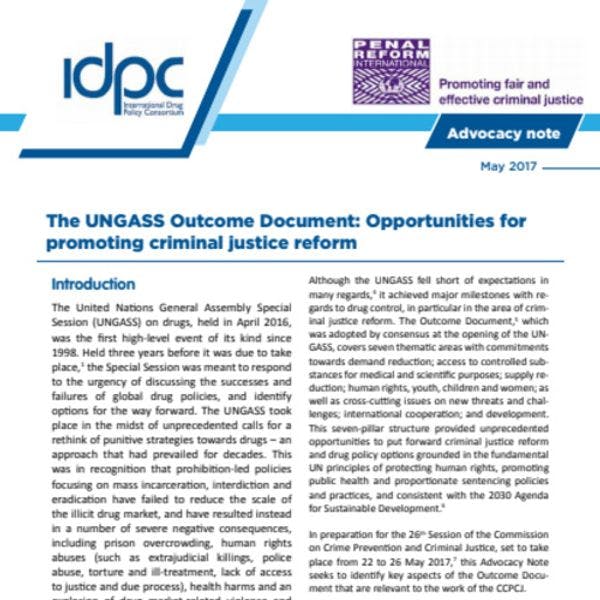แนวทางข้อตกลงที่ได้จากการประชุม UNGASS: โอกาสในการปฏิรูปกระบวนการยุติธรรมทางอาญา
การประชุมสมัชชาใหญ่แห่งสหประชาชาติ (UNGASS) เกี่ยวกับยาเสพติดซึ่งจัดขึ้นเมื่อเดือนเมษายน พ.ศ. 2559 เป็นงานระดับสูงระหว่างประเทศตั้งแต่ปี พ.ศ. 2541 ซึ่งจัดขึ้นเมื่อสามปีก่อนหน้า โดยจะมีการจัดประชุมเฉพาะพิเศษขึ้นเพื่อตอบสนองต่อ ความเร่งด่วนของการอภิปรายเกี่ยวกับความสำเร็จและความล้มเหลวของนโยบายยาเสพติดทั่วโลกและระบุทางเลือกสำหรับแผนการทำงาน UNGASS เกิดขึ้นท่ามกลางการเรียกร้องจากนานาชาติให้มีการเปลี่ยนแนวนโยบายและการจัดการกับแนวปัญหายาเสพติดจากแนวทางเดิมที่มีมานานหลายทศวรรษ การยอมรับนโยบายการห้ามการใช้ยาซึ่งมุ่งเน้นไปที่การจับขัง และ การกวาดล้างยาเสพติดที่ล้มเหลวในการลดปริมาณของตลาดยาเสพติดที่ผิดกฏหมาย ที่ส่งผลให้เกิดผลกระทบเชิงลบที่ร้ายแรงหลายอย่างรวมถึงความแออัดยัดเยียดในกลุ่มประชากรผู้ต้องขัง การละเมิดสิทธิมนุษยชน การทำร้ายร่างกายการทรมานและการปฏิบัติอย่างโหดร้าย การขาดการเข้าถึงกระบวนการและกระบวนการที่เหมาะสม) อันตรายต่อสุขภาพและการแพร่ระบาดความรุนแรงในตลาดยาและ การคดโกง การศึกษาของคณะกรรมาธิการสิทธิมนุษยชนแห่งสหประชาชาติที่จัดขึ้นในช่วงประชุมสภาสิทธิมนุษยชนครั้งที่ 30 ในเดือนกันยายน พ.ศ. 2558 จึงได้กล่าวถึงผลกระทบด้านสิทธิมนุษยชนของนโยบายยาเสพติด การจัดการกับความกังวลเกี่ยวกับสุขภาพ ระบบงานยุติธรรมและอาชญากรรม ซึ่งรวมถึงการเลือกปฏิบัติต่อสิทธิของเด็กและชนพื้นเมือง
ในการเตรียมการสำหรับการประชุมรอบที่ 26 ของคณะกรรมาธิการเรื่องการป้องกันอาชญากรรมและความยุติธรรมทางอาญาได้กำหนดให้มีขึ้นในระหว่างวันที่ 22 ถึง 26 พฤษภาคม พ.ศ. 2560 โดย งานแนะแนวนโยบายการปฏิรูป ที่ร่วมเขียนโดย International Drug POlined Consortium และ Penal Reform International จึงได้มีความพยายามที่จะระบุประเด็นสำคัญของเอกสารผลข้อตกลง ที่เกี่ยวข้องกับงานของ CCPCJ
สมัครสมาชิก แจ้งข่าว IDPC ทุกเดือน เพื่อรับข้อมูลเกี่ยวกับประเด็นที่เกี่ยวข้องกับนโยบายยาเสพติด
กรุณาดูด้านล่างสำหรับข้อมูลเพิ่มเติมเป็นภาษาอังกฤษ
By Penal Reform International × Remove Author By International Drug Policy Consortium (IDPC) × Remove Author
The United Natons General Assembly Special Session (UNGASS) on drugs, held in April 2016, was the frst high-level event of its kind since 1998. Held three years before it was due to take place, the Special Session was meant to respond to the urgency of discussing the successes and failures of global drug policies, and identfy optons for the way forward. The UNGASS took place in the midst of unprecedented calls for a rethink of punitve strategies towards drugs – an approach that had prevailed for decades. This was in recogniton that prohibiton-led policies focusing on mass incarceraton, interdicton and eradicaton have failed to reduce the scale of the illicit drug market, and have resulted instead in a number of severe negatve consequences, including prison overcrowding, human rights abuses (such as extrajudicial killings, police abuse, torture and ill-treatment, lack of access to justce and due process), health harms and an explosion of drug market-related violence and corrupton. A study of the High Commissioner for Human Rights, tabled at the 30th Human Rights Council session in September 2015, outlined the human rights impact of drug policies, addressing concerns relatng to health, criminal justce, discriminatory practces, rights of the child and Indigenous peoples.
In preparation for the 26th Session of the Commission on Crime Prevention and Criminal Justice, set to take place from 22 to 26 May 2017, this Advocacy Note by the International Drug POlicy Consortium and Penal Reform International seeks to identify key aspects of the Outcome Document that are relevant to the work of the CCPCJ.
Keep up-to-date with drug policy developments by subscribing to the IDPC Monthly Alert.
